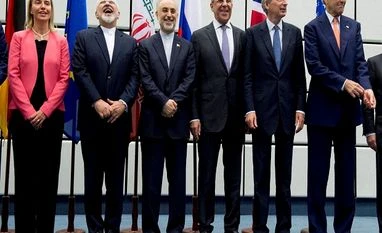After marathon overnight talks on Tuesday, negotiators have reached a landmark deal aimed at reining in Iran's nuclear program.
Tehran has been negotiating with the UN Security Council (China, France, Russia, UK and USA) plus Germany for years and deadlines have been extended many times in the hope of arriving at a workable plan.
The deal overcame stiff opposition from US allies like Israel and Saudi Arabia, who say Iran cannot be trusted with a nuclear program of any kind. However, the deal is important for President Obama's foreign policy as it aims to fix the ruptured relations between Iran and the West.
So how does all this impact India? We list some key takeaways for India from this deal.
The Oil Connection
India has long enjoyed good relations with Iran and so this deal is a positive for the country. Iran was until 2006 India’s second-largest supplier of crude oil but it dropped to number seven by the end of 2013-14. India stopped importing Iranian oil in March because of US pressure. The US’ Comprehensive Iran Sanctions, Accountability, and Divestment Act of 2010 punishes companies and individuals aiding Iran’s petroleum sector. Instead India has rely on Venezuela for buying gas. Now, Asia’s third-largest crude importer, 60% of which comes from West Asia, has some reasons to cheer.
Cheaper crude
More From This Section
Oil prices might drop further as Iran will in all probablity increase its oil production. According to a Reuters survey, Iran produces about 2.8 million barrels per day (bpd), but exports only 1 million bpd. The Reuters report claims, “(Iran) is keeping about 30 million barrels of crude on a fleet of tankers ready to be shipped when allowed, into a market already flooded with supply.” A fall in global oil prices will be good news for India too. The Economic Survey (2015) estimates that a $1-a-barrel fall in international crude oil prices is likely to reduce India’s net import bill by $0.9 billion a year.
Boost to Chabahar Port
Recently, Union shipping minister Nitin Gadkari was in Iran to sign a memorandum of understanding (MOU) on the Chabahar port expansion project. This project is of great significance to India as it will give access to Afghanistan’s garland highway.
As access through Pakistan is a distant dream, the Chabahar port will help Indian goods to reach four major cities in Afghanistan — Herat, Kandahar, Kabul and Mazar-e-Sharif quickly. On the other hand, Afghan dry fruits can reach the Indian markets through this port. The port can be used to ship crude oil and urea, saving transportation costs and reducing freight time from India to Central Asia and the Gulf by about a third. It is a win-win project for India. The port is also India’s gateway to the rest of Central Asia and Eurasia.
Other projects to get rolling
Projects like Farzad-B gas field in the Persian Gulf and the gas pipeline plan between India and Iran will get a push. Farzad-B gas field was discovered by ONGC Videsh Limited in 2008 but India has since not pursued the project aggressively due to US sanctions against Iran. The gas field holds an estimated gas reserves of 21.68 trillion cubic feet (tcf), of which 12.8 tcf are recoverable. The reserves are said to be almost thrice the largest gas field in India.
Iran Vs Israel: Modi's tightrope walk
The Narendra Modi led government has been forthcoming about its relations with Israel. But now, the government will have a tricky task on its hands as it will try to expand its trade ties with Iran without offending Israel.
)